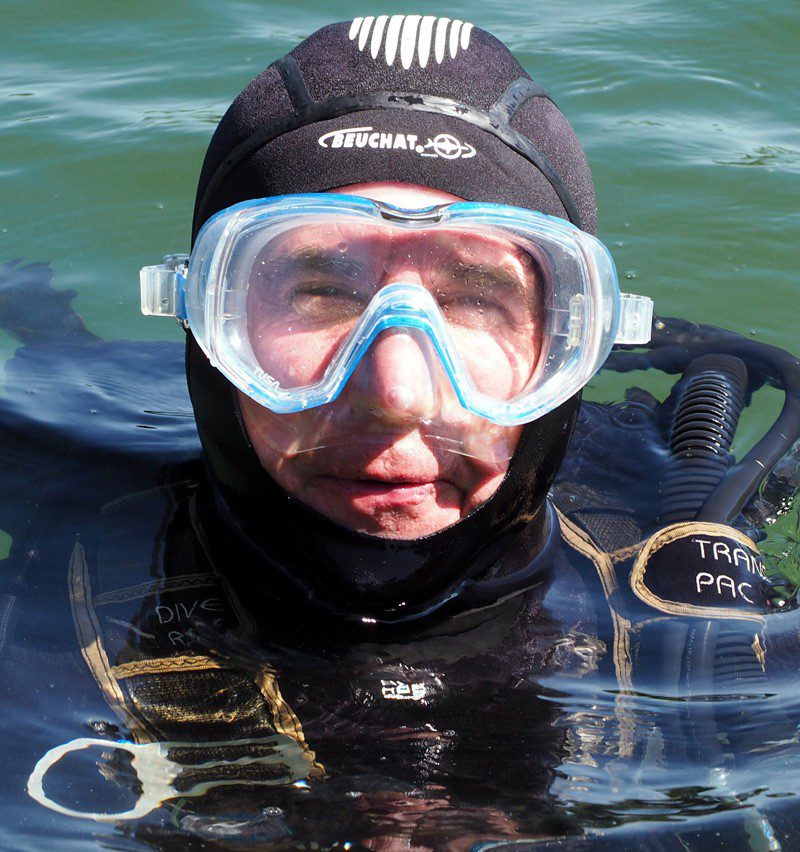Some divers follow the accepted conventions when it comes to decompression, while others prefer to go their own sweet way. MIKE WARD finds out how they’re all getting on
Decompression. It’s something you really ought to care about and take an interest in – well, unless you want to train as a commercial saturation diver and let someone else worry about it.
And if you’re tempted by the commercial route, be advised that all your diving will be in cold water at extreme depth and zero vis, fettling bits of old pipework by touch, followed by a month locked in a small pressurised room with two other pipe-fettlers and no air-freshener, so even a moment’s thought should be enough to convince you that your future lies elsewhere.
Having thus established that you should care about your decompression strategy I’d like to share with you some ideas you might wish to avoid.

First, the Steve technique, pioneered by the chairman of my original dive club. After years of ignoring dive-tables he had bought an early dive-computer, but only then discovered that it bleeped long, loud and insistently if he didn’t do as he was told.
Refusing to submit to the instructions of a mere machine, Steve continued to dive his way, ascending however and whenever he wanted, and dealt with the irritating thing post-dive by chucking it into a previously prepared bucket of water until it stopped screaming.
Steve is now alive and well and has made a full recovery from the double hip-replacement necessitated by bone damage caused by something or other. Probably something inherited. His shoulders are next.

A VARIANT OF the Steve is the Chris. Chris was on a Red Sea liveaboard in winter and had brought a drysuit. After a long, deep dive he arrived at his first stop with the beginnings of a problem that steadily became more urgent. Finally, he had no other options. Either he would have to pee in his drysuit or miss the last 10 minutes of his stops.
Either way had downsides. If he surfaced with missed stops, his computer would lock and he would miss the rest of the day’s diving or, worse, even get bent and miss the rest of the week’s diving.
But if he took a pee, and it felt as if there were gallons in there, he’d be diving the rest of the week in a smelly suit and, worse, he’d have to explain to a boat full of people why he was rinsing out his suit.
A moment’s thought provided the solution. Unclipping his reel, he took off his computer and attached it to the line, reeling out as he ascended the last few metres and leaving the computer to finish the stops while he attended, blissfully, to his call of nature. Surely an instrument as up to date as his computer could do the deco for him.

AN ALTERNATIVE VARIANT of this technique is the Dave. Dave missed, ooh, quite a few minutes of stops on the morning dive, but had the foresight to have disabled his computer’s audible alarms, so he simply pretended that all was well.
Leaving his computer on the boat for subsequent dives and just following his buddy provided his computer with the necessary 24-hour break to get back in the game, with nobody the wiser.
The technique did, however, have an unfortunate consequence, though with a very well-hidden silver lining.
Dave’s lack of interest in the data being provided by his computer extended to ignoring the gas integration, except he knew that the computer was gas-integrated, so didn’t see why he needed a standard pressure-gauge as well.
Presumably it would only have been another gauge to ignore, in any case. Come the final dive of the week, the inevitable happened. He found himself at 30m with 15 minutes of stops and no gas. Really no gas.
If he’d had a conventional pressure-gauge, the needle would have been bent around the stop. Oh yes, and, honestly, he had no idea how that state of affairs had come about, none at all.
And the silver lining? Well, in the post-dive debrief, conducted, incidentally, at extreme volume by the dive-guide who had saved his backside, Dave finally realised that diving was not for him.

BACK TO DECO strategies, and there’s the Pete, who was a tech wannabe with an Internet habit. A few years ago, the net was alive with dive-forums, and decompression theories always generated opinion. Often heated, passionately held, and largely wrong.
Pete was an enthusiastic forum-eer with an unfortunate capacity for believing the last thing he read, a distinct inclination to take things to extremes, the brains to work things out for himself and the stupidity to believe that it would all work out in real life.
One theory – laughable, really, but people believed it – was that doing stops at depth reduced the shallower stops required, and Pete was convinced. Using readily available software (his description, goodness knows where he found it) he built a plan that was, he said, right on the cutting edge, and booked on a dive to try it out.
The plan, inevitably, turned out to be quite a long way ahead of the cutting edge. Further even than the bleeding edge, which is where the cutting edge gets nasty.
On the plus side, Pete saved a fair bit of money on deco gases that day, and he very much enjoyed the helicopter ride, or would have enjoyed it had he been conscious.
And the positives didn’t stop there. The six-month break from diving suggested by the chamber gave him time to sell his diving gear for enough money to finance a very nice set of golf-clubs. He would have made even more money, if his suit hadn’t been cut off with what seemed like garden shears.

STILL, AT LEAST they all got topside – unlike Andy, who had read about Haldane’s pioneering work on decompression and decided to use that knowledge to develop a strategy that didn’t require anything but a depth gauge.
His basic idea was, as Haldane noted, that you can halve your depth, pretty much instantaneously, at any time and with no worries about ill-effects. So all you need to do is note your depth and ascend to half of it.
As previously noted, the ascent rate is irrelevant. You just need to make sure you don’t go shallower than half your preceding depth, and that’s it. Then you halve your remaining depth, and so on.
You will, of course, have spotted the obvious flaw in the plan; no, not the fact that it’s complete Horlicks, but the fact that if Andy followed it exactly he would never reach the surface, being trapped making ever smaller ascents as the days and months ticked past.
At which point, I feel I need to provide you with a better way, to point you toward a deco system that will work.
I can do no better than paraphrase a well-known instructor of technical diving who summed the process up in this manner: what you need to do is ascend as slowly as you have to but as quickly as you can.
Clear?

MIKE WARD has been diving for almost 40 years and writing about his experiences for most of that time. He dives regularly at home and works with Scuba Travel to escort specialist wreck-diving safaris overseas.
Also by Mike Ward on Divernet: Is DJI action-cam really ‘better in low light'?, Let's get physical: life-cycle of a diver, Divers’ complete guide to drysuit selection, Scapa Flow 100 history & wrecks


I love pouring bleach down my floor heater registers. It stinks for a while but gradually clears nicely. Thank you for the suggestion!